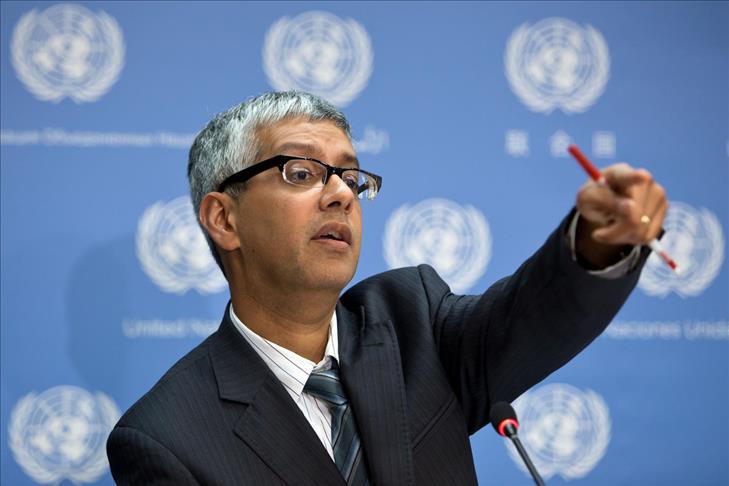UN inspectors look for incidents of alleged chemical weapons in Syria
Earlier UN stated its hope, the final report will be ready by late October. “It is their intention to do that by that time,” Farhan Haq associate spokesman confirmed to AA.

UNITED NATIONS (AA) -- The work of UN inspectors in Syria to detect traces of chemical weapons use has continued with full steam. The United Nations spokesman’s office in New York reported on Friday morning that UN mission investigating “alleged use of chemical weapons in Syria” is now working on the ground on a full comprehensive report.
Earlier UN stated its hope, the final report will be ready by late October. “It is their intention to do that by that time,” Farhan Haq associate spokesman confirmed to AA.
He said, UN believes they will have necessary safety for their inspectors to do their work on the ground in Syria.
The list of incidents
According to UN the probed allegations are related to various locations and previously reported incidents. The UN inspectors are now investigating the incidents in Khan al-Assal, of 19 March, Sheikh Maqsoud of 13 April, Saraqeb of 29 April, Ghouta of 21 August, Bahhariyeh of 22 August, Jobar of 24 August and Ashrafiah Sahnaya of 25 August – all occurred in 2013.
Farhan Haq repeated that the report is based on a number of allegations presented to the United Nations Secretary General, of which seven have been found to secure investigation according to the UN Secretary General's mechanism for investigation of alleged use of chemical and biological weapons.
Associated spokesman Haq also told AA that UN team “is the same as Dr. Ake Sellstrom’s team,” but he could not say what nationality UN inspectors were.
Earlier UN said, the Sellstrom’s team, is composed of experts and specialists from the Organization for the Prohibition of Chemical Weapons (OPCW) and the World Health Organization (WHO), both UN specialized agencies.
While United States and major Western countries Britain, France and Germany – including Turkey says they have evidence – Assad’s regime used chemical weapons at the deadliest attack on 21 August this year in the suburb of Damascus – Russia and Syria are accusing opposition forces for using chemical weapons.
Impartial UN team
UN say the continued activity of their inspectors – “uses the same impartial fact-finding modalities and techniques applied to the first conducted round of investigations.”
This means “using scientifically agreed and accredited environmental and epidemiological methods such as sampling and laboratory analyses as well as interviews with physicians, victims and parties connected to the incidents, said the team’s leader professor Ake Sellstrom,” UN written statement of Friday says.
The UN team of investigators, which returned to Syria for a second working visit on 25 September, expects to finalize its activities in the country by Monday, 30 September.
UN say that in the course of performing UN inspectors task, the experts in Syria “have received several documents and samples and have conducted many interviews.”
Syria similar to Iraq
On the other hand, the process of putting under control and destroying the Syrian chemical weapons will be the responsibility of the OPCW –set up to verify Syrian compliance with the Convention of Chemical Weapons (CWC) that Damascus signed earlier this month as a part of the verification process of disarmament in Syria.
This will be similar to process performed by UN inspectors in Iraq in the 1990s when Saddam Hussein was ordered by the UN Security Council to dismantle all WMD (Weapons of Mass Distruction) following the 1990-91 Gulf War.
by Erol Avdovic
englishnews@aa.com.tr
Anadolu Agency website contains only a portion of the news stories offered to subscribers in the AA News Broadcasting System (HAS), and in summarized form. Please contact us for subscription options.

